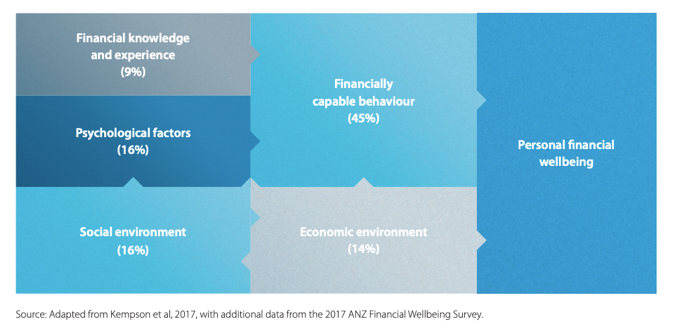-
Estimated reading time
8 minIn this article
- Key elements of the Financial Wellbeing Score
- The impacts of Covid on younger Aussies
- How to improve your Financial Wellbeing

No doubt about it - 2020 has been one for the books. And not entirely the good ones, unfortunately.
Last year has brought with it a whole new range of fears about our financial future, no matter how confident we were feeling beforehand. And according to the ANZ Roy Morgan Financial Wellbeing Indicator for July1 last year, young Aussies have been hit the hardest when it comes to employment post COVID-19.
We survey 50,000 Australians annually about how the country’s financial habits and feelings are changing by measuring their Financial Wellbeing Score out of 100 – and update these results on a quarterly basis. The July report1 found that Australians are feeling less comfortable about their bank balances.
The core of the Financial Wellbeing Score
Your financial wellbeing is made up of five key elements:
- The wider economy (your income and industry)
- Financial behaviours (how you save, borrow and spend)
- Your demographics (age, government support, home ownership)
- Your financial knowledge (understanding risks and products)
- How you feel (confidence, control)

The report1 shows Australia’s average financial wellbeing has fallen from 60.7 (out of 100) Pre-COVID-19 (12 months to March 20) to 56.5 Post-COVID-19 (April-May 20) last year alone - one of the biggest drops we’ve seen in a long time. And that was only in April and May, before the second wave of COVID-19 was a reality.
Before the pandemic, Australia’s financial wellbeing score was on the up. In fact, the ANZ Roy Morgan Financial Wellbeing Indicator Report for December 20192shows that financial wellbeing had risen from 57.4 to 59.7 in only 5 years - a notable 2.3-point improvement from December 2014 to June 2019.
According to the most recent report1, some of the biggest things to change last year were our comfort levels - ‘Feeling comfortable’ about one’s current and future situation was down 13.7% for April and May - and our ability to get by, with ‘meeting everyday commitments’ declining by 5.5%. Looking forward, our ‘resilience for the future’ (the ability to cope with financial setbacks) also fell by 1.9%.
Young Aussies feeling the pinch
Young Australians are feeling the financial impacts of COVID-19 most—43.7% of Young Adults* have been impacted by negative employment consequences (have been stood down, had their pay reduced for working the same hours, were working reduced hours or were made redundant) during April and May last year. Only 27.3% of Older Families** were in the same boat. More than a third also said that they had less than a month’s income in savings before the crisis started. Without a rainy day fund to fall back on, it can feel hard to get back on your feet when your income takes a knock or the economy hits a pothole.
*Young Adults – 18-39 year olds who are studying full time or 14-39 who are working (full time or part time) who are single (not married or de facto, engaged or planning to marry) and not parents
** Older Families – All 40-64 year olds or over 65 years olds still working (single, married or de facto, with or without children)
Young adults who had saved prior to the pandemic had an average of 2.4 months’ worth of income in their savings accounts before COVID-19 hit, and young families averaged a little higher at 2.8 months’ worth of income. But when compared to older families who had 6.5 months of income saved up, it’s definitely been a more uncertain time for Australia’s newer generations.
What can we do?
There are ways to help improve your financial resilience and take steps towards feeling more confident with your financial situation going forward, such as:
If these stats and sentiments hit close to home just remember - a pandemic is out of your control. But reviewing your expenses and setting up some savings (if possible!) could go a long way in helping to give your financial wellbeing a boost.
Fraud protection.
Now it’s personal.
ANZ Falcon® technology monitors millions of transactions every day to help keep you safe from fraud.
Falcon® is a registered trademark of Fair Isaac Corporation.
